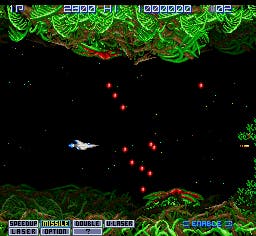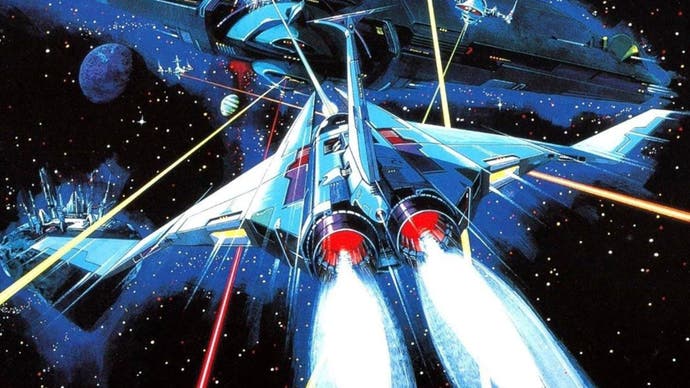My favourite planet: Gradius
Core workout.
I'm not one for lore, I'm afraid to admit, as can be amply illustrated by the fact I've only just discovered that Gradius - a series close to my heart, and one that's taken the most from my wallet over the years in various forms - takes its name from the fictional planet its hero ship Vic Viper calls home. I was only dimly aware of the fact that ship was piloted by one James Burton - the name a combination plucked from Metallica, apparently in honour of James Hetfield and Cliff Burton. It seems I have much to learn.
Lore's a funny thing when it comes to older games, especially those churned out in the heady industriousness of Japan's bubble economy era, where production was often fast and loose. Maybe there was a deeper story sitting on a design document somewhere, a grand thread stringing these disparate worlds together, but I'm just as sure most of the detail was sketched in later by other hands - by someone in a marketing department on the other side of the world, perhaps, or some copywriter filling up space in one of the manuals that'd later become scripture. With Gradius, so much of the detail comes from the atypically verbose MSX spinoff Nemesis 2, with other scraps being pieced together as the series passed from one set of hands to another.

Really, though, you just have to rifle through the development team's cinema ticket stubs to see what it's all about: there's Alien, of course, in the requisite xenomorph world of Gradius 2's second stage, or the pervasive influence of Lensman's laser-filled brand of sci-fi. For all that disparate patchwork, though, for all those disparate interviews and all the disparate places you're sent, these are games with an indelible sense of place.
Gradius offers outer space as hostile and unknowable, yet it's comfortably absurd - those Moai heads floating in the ether, for example, or even in the chubby round edges of Vic Viper itself - and absolutely full of wonder. It's thanks to the shorthand of 80s video game design where no pixel could be wasted that playing a prime shooting game of the age - and I'd argue that Gradius is as premium as they get - is as instantly evocative as looking at a great piece of pulp sci-fi cover art, both able to transport you to another world in a heartbeat.
I'm not even sure if you ever get to visit the planet Gradius throughout the series - forgive me for the oversight if I'm wrong, but I've always had other priorities on my mind in the hundreds of hours I've spent playing the games over the years - but that's neither here nor there really. Konami's series is a world in itself, a place of wide-eyed wonder and fantasy. It's a short, sharp shot of 80s sci-fi that's as electrifying now as it's ever been.

